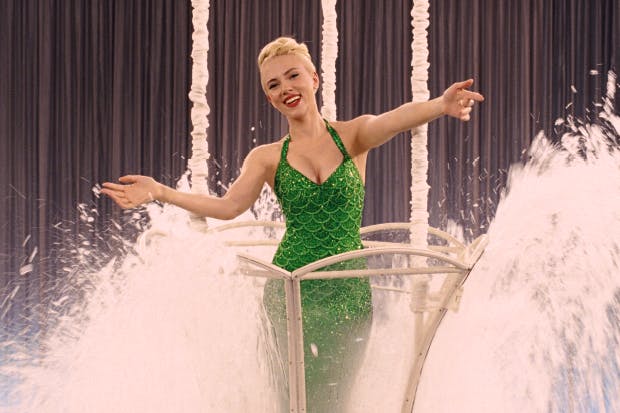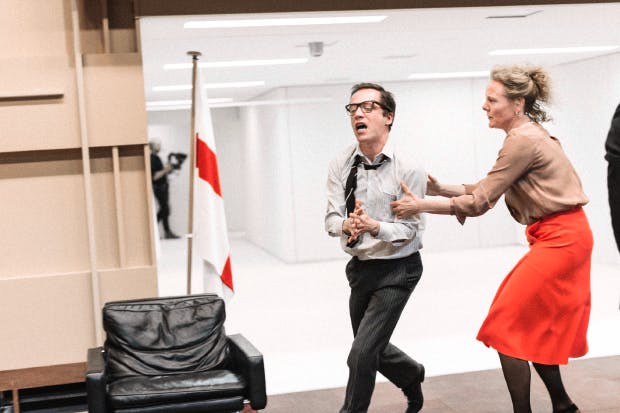One of the more obscure winners in recent years of the Berlin film festival’s Golden Bear was a version of Shakespeare’s Julius Caesar by the esteemed Taviani brothers, Paolo and Vittorio. The film, called Caesar Must Die, consisted of prisoners staging the Roman drama in their own high-security jail in Italy. The most dedicated Shakespearean or, indeed, lover of Italian cinema will have found it quite hard to enjoy. It was a tough, depressing watch.
But that’s the Berlinale all over. It favours a certain toughness and prides itself on films that engage politically, that are nakedly ‘art’ rather than obviously mainstream. Often it goes out of its way to be controversial. Berlin itself has long been controversial. A rough diamond way out in eastern Europe, and broadly disliked by the groomed and prosperous denizens of Hamburg and Munich, its previous status as Germany’s capital had, before 1991, been under Hitler.
The Berlinale was founded in 1951 in part to counter the image the city had left the world after 12 years of Nazism. From the off there was always a latent political agenda. During the Cold War the festival explicitly cocked a snook at the Soviet apparatus that enclosed West Berlin. Freedom of speech, cinematically expressed, has remained its abiding principle.
Today, the Berlinale is a smooth-running mega-machine, more star-struck than politically on the nail perhaps, operating amid the glass façades, smart hotels and many cinemas of the reconstructed Potsdamer Platz. It maintains a democratic élan by opening all its sections to the public, who book online or wait in very slow-moving queues at various booths. Cinemas east and west of Potsdamer Platz, and the capital as a whole, effectively give way to Germany’s biggest cultural event for an intense ten days.
In a piquant echo of the Taviani’s film four years ago, Rome, Caesar and two brothers again kicked off this year’s festival, though there the similarity with the 2012 winner ends. Ethan and Joel Coen’s Hail, Caesar! courts not even a hiccup of controversy. It stars — among other hefty names — George Clooney dressed throughout as a Roman soldier. One of the film’s stories concerns the actor he is playing, Baird Whitlock, being kidnapped from the set of a sword-and-sandal flick being made by Capitol Pictures in 1951. His kidnappers are ‘communists’. They plot the Sovietisation of the world, issue a ransom demand of $100,000 to Capitol, and Whitlock, whom Clooney plays well enough as a boastful wide boy, becomes interested in their credo.
So far, so silly. The movie also features Ralph Fiennes, Scarlett Johansson, Tilda Swinton and Channing Tatum. That line-up should on paper make this a trouncer of a film. But on paper the ambition stays. Fiennes plays a Noël Coward-like director of a drawing-room drama who is trying twitchily to get a properly spoken line out of cowboy idol Hobie Doyle (Alden Ehrenreich). It’s funny for about 15 seconds but what, actually, is Fiennes doing in the film? Little, except appearing in it. The same can be said of Johansson as a mermaid in a synchronised-swimming scene. Scarlett Johansson as a sulky mermaid? Bung her in.
Tilda Swinton plays identical twins Thora and Thessaly Thacker, rival newspaper columnists competing for the most salacious gossip on Capitol’s stars, but again, with neither role lasting more than a few minutes she seems wasted. A commendable performance comes from Josh Brolin as Eddie Mannix, a practising-Catholic fixer for Capitol and the single bit of glue that holds the ragged strands of the film together. Channing Tatum as actor-cum-communist Burt Gurney shines in a scene of singing and dancing sailors. Yet by the time those admittedly brilliant five minutes come along, one has lost the will to work out why on earth such a scene is in there at all.
Known and respected for more than 30 years for swipes at Hollywood, humorous attacks on corporate greed and genre subversions — all of which make Barton Fink, The Hudsucker Proxy and Fargo such memorable films — the Coen brothers have strangely run out of steam. Hail, Caesar! is boutique cinema, a movie made for movie stars but which has, in fact, failed to be written.
In fairness, its presence in Berlin, along with its box-office glamour — Clooney, Tatum and Swinton all gracing the first-night red carpet (though with hair shaved at the sides and a kind of meringue on top Tilda looked like an ice-cream gone wrong) — was largely intended to light up the festival’s start. Usually, Berlin is extremely cold in mid-February. Opening night was warm; the next two days were beautifully bright and sunny, weather thus deputising for a turkey of a gala-opener.
The choice of Meryl Streep as the competition’s jury president was instantly popular. She has German ancestry and sparkily declared the 2016 Berlinale ‘geoffnet’ — ‘open’ — at the end of a rather strained opening ceremony fronted by actress Anke Engelke. The next day Streep reportedly made some choice remarks about the lack of diversity in film-making boardrooms and added (according to one source) slightly heavy-handed commentary on assessing films from the Middle East and Africa. ‘We’re all from Africa originally …we’re all Berliners, we’re all Africans really.’
As she full well knew, Streep was there to judge films in competition. Food for the brain on the first morning came in the form of a wonderful film in Arabic, Hedi, from Tunisia. It’s about a car salesman who takes a lover just before he’s to wed a suitable girl in an arranged marriage. Simple though it sounds, it is also a compelling, tightly directed meditation on social conservatism and individual freedom, and a potential Golden Bear winner.
No real challenges arise in Jeff Nichols’s Midnight Special, starring Michael Shannon, Joel Edgerton, Kirsten Dunst and, briefly, Sam Shepard. In what Nichols calls a ‘sci-fi chase movie’, a boy has supernatural powers of vision that make him valuable to a religious sect and to the FBI, who’ve realised that he can detect US military secrets and satellites in space. The chase boils down to a very skilfully staged cross-state battle between the boy’s estranged parents and the Feds, and ends in some glorious beyond-our-world CGI.
It was an unsettling experience to watch — in Berlin — a polished but wholly English-language dramatisation of Hans Fallada’s 1947 novel Alone in Berlin, or Every Man Dies Alone as the original German title was and as the film is being called in German now. Brendan Gleeson plays, with a quiet, furtive dignity, the despairing mechanic Otto Quangel, who, after his son has been killed in France in 1940, plants postcards all over Berlin with anti-Hitler messages written anonymously on them. Emma Thompson is his exasperated but loyal wife Anna. The show is almost stolen, though not quite, by everyone’s favourite young German actor Daniel Brühl who plays the policeman who has to hunt Quangel down. It’s not a great film, but convincing and moving nonetheless.
Much more alarming, in the best sense, is Anne Zohra Berrached’s 24 Wochen (‘24 Weeks’), the only German-language film in competition. Julia Jentsch, another on-screen and on-stage favourite in Germany, is a celebrity stand-up comedian who finds out, some 20 weeks in, that her second child will have Down’s syndrome and holes in his heart. Bluntly, to abort or not to abort is the dilemma at the film’s heart — and this might touch, though not overtly, on historical memory of Nazi policy towards the handicapped. That is not what the film is about, but, giving nothing away, it grips like nothing else I’ve seen in German cinema in the past decade. Tough, searing stuff indeed.
Got something to add? Join the discussion and comment below.
Get 10 issues for just $10
Subscribe to The Spectator Australia today for the next 10 magazine issues, plus full online access, for just $10.














Comments
Don't miss out
Join the conversation with other Spectator Australia readers. Subscribe to leave a comment.
SUBSCRIBEAlready a subscriber? Log in